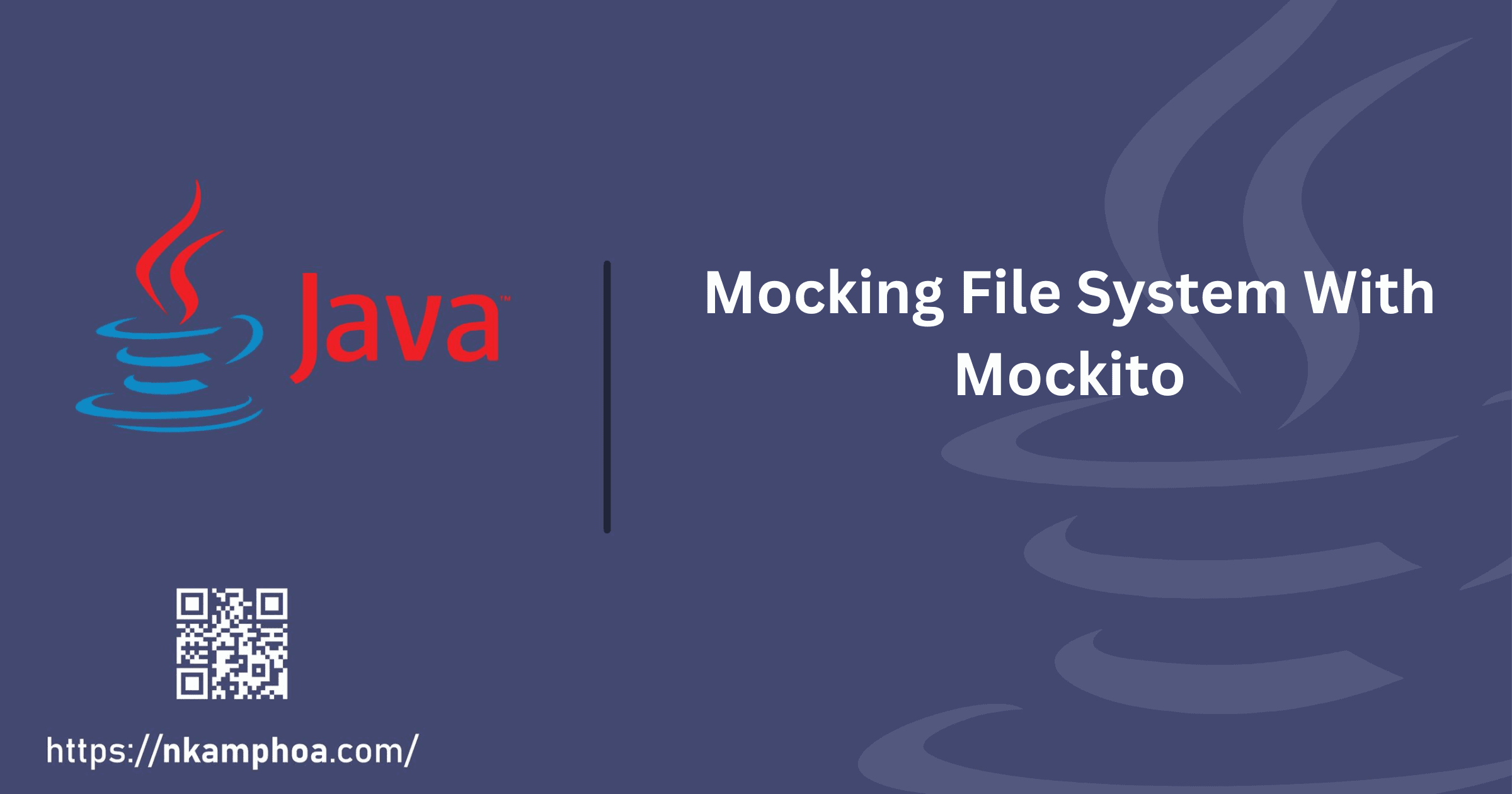Introduction
Mocking Static methods is always a big challenge when it comes to testing Java programs. We saw in this previous article how to overcome this obstacle with the use of Mockito. In this article, our focus is on how to mock file system operations. You will learn how to mock the methods from the Path and Files class of the package java.nio.
The Application Under Test
The code we will use is a slightly modified version of the application we used in the tutorial on mocking static methods.
The application has three main classes:
SalesProcessor.java: This class has a public methodcomputethat takes a fileName as a parameter and calculates the total sales per product in that file. The parameter is a CSV file with the following structure"productCode;saleAmount". Thecompute()method must return aSaleobject. The method throws an exception if the file is not accessible or if its content is invalid.SaleLineParser: This class takes a string in the form"productCode;saleAmount", parses it, and returns aSaleobject. The method throws an exception if the line is invalid.Sale.javais a simple Java record with two fields:public record Sale(String productCode, int saleAmount) { }
The SalesProcessor.java class
Here is a snippet of the SalesProcessor#compute() method:
public Sale compute(String filePath) throws Exception {
Stream<String> sales = this.readFile(filePath);
Function<String,Sale> toSale = this.lineParser::parse;
Map<String,List<Sale>> salesByProduct = sales
.map(toSale)
.collect(Collectors.groupingBy(Sale::productCode));
return computeMaxSales(salesByProduct);
}
The complete class is available here on GitHub.
The SaleLineParser.java class
Here is the snippet of the SaleLineParser#parse() method:
public Sale parse(String line){
String delimiter = ";";
String[] saleData = line.split(delimiter,-1);
if(isInvalidColumnCount(saleData))
throw new IllegalArgumentException(Constants.INVALID_LINE);
if(isInvalidField(saleData))
throw new IllegalArgumentException(Constants.INVALID_FIELD);
return new Sale(saleData[0],Integer.parseInt(saleData[1]));
}
The complete class is available here in GitHub.
The Sales.java class
public record Sale(String productCode, int saleAmount) { }
Procedure
The procedure for mocking a static method has already been covered in this tutorial, so we won’t return to it here. We’ll concentrate here on how to mock file processing operations.
Mocking scenarios
Here we’ll simulate different scenarios to thoroughly test the SalesProcessor class.
Mocking a Non-existing file
First, we’ll simulate a non-existent file. We’ll mock the exists() method of the Files class. Since this exists() method takes a Path object as a parameter, we’ll also mock the Path class.
@Test
void test_File_not_Accessible_NonExisting() throws Exception {
//given
String anyFile = "test.csv";
bean = new SalesProcessor();
try(MockedStatic<Files> mockFiles = mockStatic(Files.class);
MockedStatic<Path> mockPath = mockStatic(Path.class)){
mockPath.when(() -> Path.of(anyFile)).thenReturn(this.mockPath);
mockFiles.when(() -> Files.exists(this.mockPath)).thenReturn(false);
//when then
Exception expectedException = Assertions.assertThrows(IllegalArgumentException.class,() -> bean.compute(anyFile));
Assertions.assertEquals(Constants.FILE_NOT_ACCESSIBLE, expectedException.getMessage());
}
}
Mocking a Not readable file
Our second test will simulate a situation where the file does exist but is unreadable. We’ll mock the isReadable() method of the Files class. As in the previous case, we’ll also mock the Path class, which gives us the following:
@Test
void test_File_not_Accessible_NotReadable() throws Exception {
//given
String anyFile = "test.csv";;
bean = new SalesProcessor();
try(MockedStatic<Files> mockFiles = mockStatic(Files.class);
MockedStatic<Path> mockPath = mockStatic(Path.class)){
mockPath.when(() -> Path.of(anyFile)).thenReturn(this.mockPath);
mockFiles.when(() -> Files.exists(this.mockPath)).thenReturn(true);
mockFiles.when(() -> Files.isReadable(this.mockPath)).thenReturn(false);
//when then
Exception expectedException = Assertions.assertThrows(IllegalArgumentException.class,() -> bean.compute(anyFile));
Assertions.assertEquals(Constants.FILE_NOT_ACCESSIBLE, expectedException.getMessage());
}
}
Mocking a Content not valid file
In this third test case, we will simulate a situation in which the file content is not compatible with the desired type (CSV). We’ll assume that a CSV file is a file whose MIME type is part of a set that we’ll define as an Enum.
As in the other cases, we’re going to mock up the Files and Path classes. To obtain the MIME type from the Files class, we use the probeContentType() method.
@Test
void test_File_Content_Invalid() throws Exception {
//given
String anyFile = "test.csv";
String invalidMimeType = "video/x-msvideo";
bean = new SalesProcessor();
try(MockedStatic<Files> mockFiles = mockStatic(Files.class);
MockedStatic<Path> mockPath = mockStatic(Path.class)){
mockPath.when(() -> Path.of(anyFile)).thenReturn(this.mockPath);
mockFiles.when(() -> Files.exists(this.mockPath)).thenReturn(true);
mockFiles.when(() -> Files.isReadable(this.mockPath)).thenReturn(true);
mockFiles.when(() -> Files.probeContentType(this.mockPath)).thenReturn(invalidMimeType);
//when then
Exception expectedException = Assertions.assertThrows(IllegalArgumentException.class,() -> bean.compute(anyFile));
Assertions.assertEquals(Constants.INVALID_FILE_CONTENT, expectedException.getMessage());
}
}
Mocking an invalid CSV format file
We’re now going to simulate the situation where the file exists, is readable, and is of the right type, but some lines don’t conform to the desired CSV format. To do this, we’ll mock the lines() method of the Files class.
@Test
void test_File_With_Erroneous_Lines() throws Exception {
//given
String invalidLine = "P1;20;";
Stream<String> simpleStream = Stream.of("P1;10","P2;5",invalidLine,"P1;30");
String anyFile = "test.csv";
String validMimeType = "text/csv";
bean = new SalesProcessor();
try(MockedStatic<Files> mockFiles = mockStatic(Files.class);
MockedStatic<Path> mockPath = mockStatic(Path.class)){
mockPath.when(() -> Path.of(anyFile)).thenReturn(this.mockPath);
mockFiles.when(() -> Files.exists(this.mockPath)).thenReturn(true);
mockFiles.when(() -> Files.isReadable(this.mockPath)).thenReturn(true);
mockFiles.when(() -> Files.probeContentType(this.mockPath)).thenReturn(validMimeType);
mockFiles.when(() -> Files.lines(this.mockPath)).thenReturn(simpleStream);
//when then
Exception expectedException = Assertions.assertThrows(IllegalArgumentException.class,() -> bean.compute(anyFile));
Assertions.assertEquals(Constants.INVALID_LINE, expectedException.getMessage());
}
}
Mocking a Valid file content
For our final test, we’ll assume that the file is valid in every respect. Here is our final test case:
void test_Simple_File() throws Exception {
//given
Stream<String> simpleStream = Stream.of("P1;10","P2;5","P1;20","P1;30");
String anyFile = "test.csv";
String validMimeType = "text/csv";
bean = new SalesProcessor();
try(MockedStatic<Files> mockFiles = mockStatic(Files.class);
MockedStatic<Path> mockPath = mockStatic(Path.class)){
mockPath.when(() -> Path.of(anyFile)).thenReturn(this.mockPath);
mockFiles.when(() -> Files.exists(this.mockPath)).thenReturn(true);
mockFiles.when(() -> Files.isReadable(this.mockPath)).thenReturn(true);
mockFiles.when(() -> Files.probeContentType(this.mockPath)).thenReturn(validMimeType);
mockFiles.when(() -> Files.lines(this.mockPath)).thenReturn(simpleStream);
//when
Sale result = bean.compute(anyFile);
// then
Assertions.assertAll(
() -> Assertions.assertEquals("P1", result.productCode()),
() -> Assertions.assertEquals(60, result.saleAmount())
);
}
}
Conclusion
In this article, you learned how to mock file system interactions by simulating static methods of the Path and Files classes.
The full code of this tutorial can be found here on GitHub.





Pingback: How to Mock Static Methods With Mockito